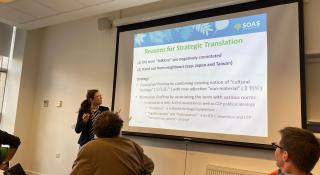
Breadcrumbs navigation
Post-growth agrifood systems: Towards an emancipatory politics
In this short video extract, authors Rajeswari S. Raina and Rishabh Kachroo discuss the key arguments from their new Review of international studies article - 'Post-growth agrifood systems: Towards an emancipatory politics'.
Want to know more? You can read the full article at DOI: https://doi.org/10.1017/S0260210524000408
This particular article is open access, however BISA members receive access to all articles in RIS (and our other journal European Journal of International Security) as a benefit of membership. To gain access, log in to your BISA account and scroll down to the 'Membership benefits' section. If you're not yet a member join today.
Abstract
A world without hunger demands a post-growth rewiring of the global agrifood system predicated on emancipatory politics that enables reform of actors and institutions outside agriculture. This is necessary to shift out of the prevalent growth-hegemonic framing of agriculture and its contributions to economic growth, where the structural injustice of hunger is rendered invisible. Recent International Relations (IR) scholarship highlights the institutional arrangements underpinning global agrifood problems. This paper uses critical IR theory to understand the structural mechanisms and relations of power through which the growth-hegemonic theorisation of agriculture is produced and reproduced, sustaining hunger within an exceedingly financialised agro-industrial complex. The structural power of knowledge shaping the interlocking structures of finance, production, and security is evident in the extremely high multilevel concentration in modern agrifood systems. This structural power evident in local decentralised agroecological systems and in transnational agrarian movements reflects post-growth principles of sufficiency, shared prosperity, care, ecological and social justice.Together, they are the counter-hegemonic voices, cooperative social systems, and class interests championed by post-growth politics.
Image from Dan Meyers on Unsplash


